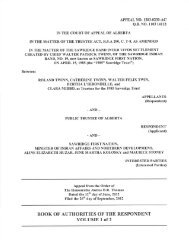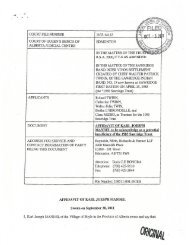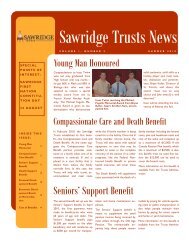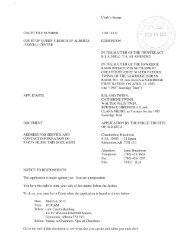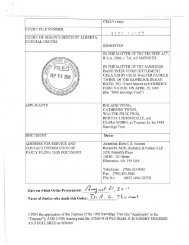31420-12-1 SAWRIDGE, Indian vs. ROLAND, Twinn et al
31420-12-1 SAWRIDGE, Indian vs. ROLAND, Twinn et al
31420-12-1 SAWRIDGE, Indian vs. ROLAND, Twinn et al
You also want an ePaper? Increase the reach of your titles
YUMPU automatically turns print PDFs into web optimized ePapers that Google loves.
F10<br />
1 Public Trustee’s Office would be in if they had an obligation or had created a practice or<br />
2 a standard where they acted for <strong>al</strong>l unrepresented minors in any case where they didn’t<br />
3 have representation available to them at the cost of the Public Trustee’s Office. Frankly,<br />
4 the resources that would be required there would, I suspect, far exceed the resources of<br />
5 the Youth Crimin<strong>al</strong> Defence Office and simply do not reflect the re<strong>al</strong>ity of the Public<br />
6<br />
7<br />
Trustee’s Office at this time, My Lord.<br />
8 Just because I’m at that point in our brief, My Lord, we’ve identified starting at paragraph<br />
9 71ofour origin<strong>al</strong> brief and going through to paragraph 78 that there might be a need for<br />
10 direction from the Court about a potenti<strong>al</strong> conflict of interest b<strong>et</strong>ween the two groups of<br />
11 minors. My friend Mr. Por<strong>et</strong>ti and my friend Ms. Bonora have clarified that in fact<br />
<strong>12</strong> there -- it’s not the case that there’s a group of minors that will lose their beneficiary<br />
13 status and a different group of minors that will gain. We’re only de<strong>al</strong>ing with minors that<br />
14 will lose their beneficiary status. So indeed, our initi<strong>al</strong> understanding of Mr. Bujold’s<br />
15 evidence appears to be incorrect and we apologize to the Court for that. We haven’t<br />
16 examined on the affidavit y<strong>et</strong>. And there had been some confusion on this point<br />
17 throughout. So I appreciate my friends’ clarification. It does not appear that there is any<br />
18 imminent or apparent complicate of interest b<strong>et</strong>ween any of the groups of minors that the<br />
19<br />
20<br />
Public Trustee has identified at this point in time.<br />
21 Then beginning at paragraph 79 of our submissions, My Lord, we’re de<strong>al</strong>ing with the<br />
22 condition that the Public Trustee is requesting in relation to its appointment to be<br />
23 granted -- to be granted indemnity for its solicitor client costs for the entire proceeding.<br />
24 And my friends have responded to those submissions extensively and very thoroughly.<br />
25 And then we’ve responded -- I can just take you -- we’ve responded to those submissions,<br />
26 My Lord, in our reply brief starting at paragraph 48 of the brief and carrying through until<br />
27 paragraph 62 of the brief. And certainly, My Lord, I’m not standing before this Court to<br />
28 try and suggest that Okanagan is not the case on advance costs. It clearly is. It’s the<br />
29 tripartite test that’s applied in the vast -- well, the vast majority of cases. Iwould stand<br />
30 before this Court and suggest to you that we’re de<strong>al</strong>ing with a very unique situation. I’ve<br />
31 been unable to locate any authority where the court has been asked to consider an advance<br />
32 costs application or indemnity for solicitor client costs throughout the entire proceeding on<br />
33 the basis that the Court’s parens patriae jurisdiction has been engaged. And so we<br />
34 certainly take that position with the Court that this -- and I apologize, My Lord, I’m<br />
35 g<strong>et</strong>ting ahead of myself. The L.C. case, and that’s the first L.C. decision that you find at<br />
36 Tab 9ofour authorities, it does de<strong>al</strong> with the Okanagan case, My Lord. Iwas struck,<br />
37 quite frankly, that the Court didn’t apply perhaps as stringent a standard of the Okanagan<br />
38 case as it does in some. And indeed, Justice Graesser comments on, in paragraph 75, that<br />
39 he does not require the same level of d<strong>et</strong>ail of impecuniosity as was required in the cases<br />
40 he cites. And that those are cases seeking (INDISCERNIBLE) bottom findings which<br />
41 apply adifferent test. And we don’t -- we don’t, unfortunately, have a great de<strong>al</strong> of d<strong>et</strong>ail



